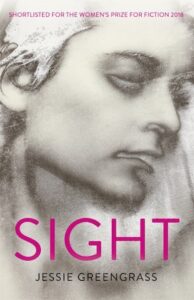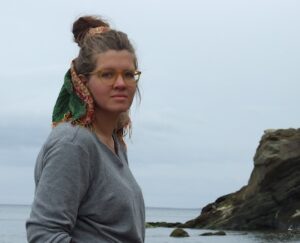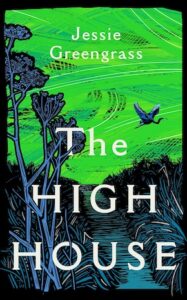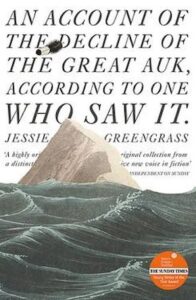Larkin, Sebald and the backs of envelopes
by Jessie GreengrassJessie Greengrass burst onto the literary scene in 2016 with her prize-winning story collection An Account of the Decline of the Great Auk, According to One Who Saw It, and her debut novel Sight (2018) was shortlisted for the Women’s Prize. Her second novel The High House is a stunning investigation of the extraordinary and the everyday, as a fractured family tries to adjust to a world under once unimaginable climate strain.
Where are you now?
On the sofa in the front room, with a hot water bottle, because our house is irredeemably cold.
Where and when do you do most of your writing?
For the last six years (since my eldest daughter was born) it’s been wherever and whenever my children aren’t – which has meant usually in bed, first thing in the morning, while my partner does breakfast and the school run. But I’ve recently got my very own study, and in September the littlest one will be at nursery three days a week. The world, or at the very least the internet, will be my oyster.
How would you summarise your lockdown experience?
Sad, anxious, dull. Lucky.
If you have one, what is your pre-writing ritual?
I don’t really have one – limited time means I’ve had to get into the habit of just starting as soon as it’s time to start. But, given the option, I would stand in the kitchen for a few minutes, staring out of the window, waiting for the kettle to boil and collecting my thoughts.
Full-time or part-time?
Part-time.
Pen or keyboard?
Keyboard. But with a subsidiary system of notes scribbled on the backs of envelopes.
How do you relax when you’re writing?
I don’t write for long enough at a stretch to need to do any relaxing, really, but I do a lot of running to help me think.
How would you pitch your latest book in up to 25 words?
I wouldn’t! But if I really had to: environmental disaster sliding from future to present while people get on with their lives, trying to take care of one another. Plus birds.
Absolutely anyone who will have me.
Who do you share your work in progress with?
No one, until I’m happy that it’s as close as possible to finished, and then my agent, and then my editor. I don’t think you should show someone your work unless you’re willing to listen to their criticism and make changes accordingly, and I’m not – not because I think other people wouldn’t make good suggestions, but rather because their suggestions couldn’t solve the problems of my writing. I have to solve those for myself, and that’s how a book happens. I’m pretty weird about this sort of thing!
Which literary character do you wish you created?
Hercule Poirot. Imagine!
Share with us your favourite line/s of dialogue, poetry or prose.
There are so many odds and ends and bits and pieces in my head that are the tracks my thoughts run along that it’s hard to pick anything in particular, but I’ve been thinking about Larkin a lot lately, so:
And immediately
Rather than words comes the thought of high windows:
The sun-comprehending glass,
And beyond it, the deep blue air, that shows
Nothing, and is nowhere, and is endless.
Which book do you wish you’d written?
Oh, again there are so many. Off the top of my head, right now: Anything by Sebald, which feels heretical even to say, because it would be unimaginable to be able to write like that. M. John Harrison’s novel Light. And Cold Comfort Farm, because imagine being that funny.
Which book/s have you most recently read and enjoyed?
I’ve just finished John Sutherland’s book Monica Jones, Philip Larkin and Me, which I thought a wonderfully generous book about a woman who has too often been belittled in print by men she ought to have been the equal of. An excellent book for anyone who, like me, loves Philip Larkin’s poetry but not all the rest.
What’s on your bedside table or e-reader?
A pile too high to be safe. But on the top: Cal Flyn’s Islands of Abandonment, which I am halfway through, and which is wonderful.
 Which books do you feel you ought to have read but haven’t yet?
Which books do you feel you ought to have read but haven’t yet?
I’m not sure there’s anything I feel I ought to have read, really. There are too many books in the world to feel shame about what one hasn’t got round to. There’s plenty I’d like to read, though. I’d like to feel like my life was calm enough to read something really, really long – like all of A Dance to the Music of Time. I think I’d really enjoy it.
Which book/s do you treasure the most?
All the books I loved, and read over and over, as an awkward and unhappy child. They were a point of stability and safety for me, almost as good as real-life friends.
What is the last work you read in translation?
Natsuko Imamura’s The Woman in the Purple Skirt, which is very odd, but completely engrossing.
Which story collections would you particularly recommend?
The last two really good ones I’ve read have been Jo Lloyd’s The Earth, Thy Great Exchequer, Ready Lies, and The Office of Historical Corrections by Danielle Evans.
What will you read next?
I was sent a copy of Katie Kitamura’s new novel Intimacies, which I read the first twenty pages of before getting sidetracked – I’m very much looking forward to getting back to it.
What are you working on next?
Something! Nothing! Anything! I never really know what I’m doing until I’ve done it, and can’t talk about it, because if I did it might all collapse.
Imagine you’re the host of a literary supper, who would your dinner guests be (living or dead, real or fictional)?
Well, I think the thing is that I don’t get the impression that many of the writers whose work I love would actually be all that much fun to have to dinner. Or, they’d be the sort of people who wouldn’t turn up. But I would have W.G. Sebald, and I would invite Thomas Browne and John Donne to talk to him, and then I would go into the kitchen and cry into my wine.
If you weren’t writing you’d be…?
Completely hopeless.
If you were the last person on Earth, what would you write?
Nothing, probably. Or a lot of lists. Or possibly a series of laments for a lost humanity, each one more lyrical, more detailed, more emotionally powerful than the last and which would form, collectively, a meditation so profound, so steeped in wisdom and beauty, that when, by some freak of geology, they ended up preserved in a cave across millennia to be found by some future species (hyper-evolved spiders) they would be crowned the single greatest achievement of all of human civilisation, even including all the Greeks and the Romans, Homer, that cove Shakespeare, Wang Wei, the author of the Psalms et cetera et cetera et cetera, all of them, every one… But more probably nothing.
 Jessie Greengrass spent her childhood in London and Devon. She studied philosophy in Cambridge and London and now lives in Berwick-upon-Tweed with her partner and children. Her collection of short stories An Account of the Decline of the Great Auk, According to One Who Saw It won the Edge Hill Prize 2016 and a Somerset Maugham Award. Her debut novel Sight was shortlisted for the Women’s Prize for Fiction 2018. The High House is published by Swift Press.
Jessie Greengrass spent her childhood in London and Devon. She studied philosophy in Cambridge and London and now lives in Berwick-upon-Tweed with her partner and children. Her collection of short stories An Account of the Decline of the Great Auk, According to One Who Saw It won the Edge Hill Prize 2016 and a Somerset Maugham Award. Her debut novel Sight was shortlisted for the Women’s Prize for Fiction 2018. The High House is published by Swift Press.
Read more and buy from bookshop.org
@JessGreengrass
@SwiftPress



